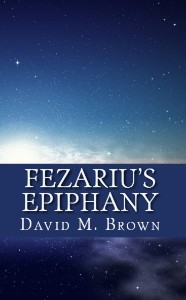Review: Fezariu's Epiphany, by David M. Brown
 |
| Fezariu's Epiphany by David M. Brown May 16, 2011 386 pgs |
At twelve years old, Fezariu believes he is possessed of a curse that causes suffering all around him - he's certain that it caused his mother to betray him and his step-father to be killed. Wishing to be rid of his past, and believing that the only way to save those he loves from the curse he carries is to run far away, Fezariu joins the Merelax Mercenaries - a group of well-trained men and women who fight for money. Sometimes the cause is less respectful or less moral than another but, as Fezariu and his friends discover, as long as the money is good, the morality is not theirs to question.
Fezariu is taken under the wing of a retired mercenary by the name of General Bayard - it is he who guides Fezariu, taking advantage of his emotional detachment, and shapes him into a great warrior. After three rigorous years of training, Fezariu and his friends are welcomed as full-fledged mercenaries. But was it worth it? Fezariu left behind his uncle Edward and his step-sister Alycea to achieve this future. And although he will go on to do great things, there will always be a piece of his past that will never let go.
We've all seen this story before. It's got its roots in everything from Harry Potter at Hogwarts to Jedis on Coruscant, to Lord Byron. I even thought, in a few scenes, that it was turning into an allegory about the American Revolution. The tortured young man is not a new concept. The novel itself is well-developed in terms of pacing and, it goes without saying, a rich fictional history. But where Brown fails is his dialogue. The scenes are pretty. The people are pretty. The action is...well, not pretty, but you get the idea. But the dialogue really suffers.
 |
| this dude! |
A lot of the time it reminded me of a video game - you know how, and maybe this is more early/mid-90s games than the newer ones, I'm not sure but - you know how when you'd reach a new stage there'd be some hippy kind of guide who would tell you what tasks lay ahead of you? There'd be a lot of information and very little style to the delivery. The best example I have is, and bear with me, Mickey's Magical Quest - where Mickey walks into a house and is greeted by some mouse/dog/disneything who looks like he's going as Dumbledore for Halloween and goes into this whole diatribe about what Mickey will face. That's kind of what it felt like. Best example in the book - Fezariu goes to Clarendon and asks some townies about the mayor, and about his opposition being assassinated. Their response sounds like it was written by one of the President Obama's speech-writers.
That aside, the book does have some definitely touching moments, and emotionally it is almost (ALMOST!) well-developed. But every time a feeling is about to come out, the dialogue gets in the way. This novel could benefit from some serious editing, preferably by an editor who gets the world of Elenchera, and who can assist Brown in finessing his style into something worthy to stand on the same shelves as Tolkein and Le Guin.

Comments
Post a Comment
Any and all feedback is welcome - thanks for taking the time!